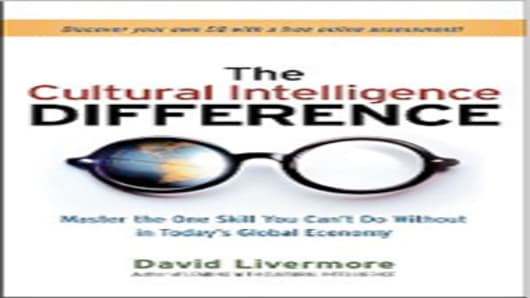CNBC GUEST AUTHOR BLOG: Three Things you Need to Know About Cultural Intelligence (CQ) by David Livermore author, "THE CULTURAL INTELLIGENCE DIFFERENCE Master the One Skill You Can't Do Without in Today's Global Economy."
Everyday we get reminders about our borderless world.
We recently learned that General Electricmade $14.2 billion in profits in 2010 yet they owed no US corporate taxes because most of their activity was abroad (*).
Last year, 67% of the commercial flights that happened were operated by Middle Eastern and Asian airlines as compared to 29% that were operated by North American and European air carriers.
Closer to home, the Hispanic population in the US just hit 51 million, more than the entire population of Spain. And it’s not going to stop anytime soon. Children of color are the new majority among US kids three and younger.
Your success in today’s world is directly connected to your ability to work effectively in a variety of different cultures. But a lot of the conventional wisdom about cross-cultural effectiveness is based upon myth and anecdote more than evidence-based research.
Now, studies from academics in more than 30 different countries points to a consistent way of measuring and developing your cultural intelligence or CQ—the capability to function effectively across a variety of cultural contexts. The research points to many promising discoveries for working across borders, whether they be national, ethnic, or even organizational or generational borders.
But here are three important things you need to know about CQ.
1. Don’t Trust your Gut
Great executives often talk about leading from the gut. Some of the research on social and emotional intelligence has supported the advantage of having good instincts for leaders when they need to guage the climate of their organization or read the intentions of a potential client. But this instinctive ability is born out of extensive experience—something that won’t necessarily apply when interacting with a business or individual from a different cultural background than one’s own. As much as we might like to think that our gut instincts will help us get by anywhere, research suggests otherwise. Working across borders does not accord with our intuition. People with cultural intelligence deliberately test their intutions.
"As much as we might like to think that our gut instincts will help us get by anywhere, research suggests otherwise. Working across borders does not accord with our intuition. People with cultural intelligence deliberately test their intutions."
2. It’s a Bottom Line Issue
Sometimes capabilities like emotional and cultural intelligence get written off as soft skills with limited tangible benefit for the bottom line. But the research finds a number of consistent pay-offs for leaders and organizations that prioritize the development of cultural intelligence. The most consistent results you can expect from having higher CQ are: Superior cross-cultural adjustment, improved job performance, enhanced personal well-being, and greater cost-savings and profitability. Cultural intelligence and diversity initiatives shouldn’t just be delegated to the HR office. The organizations that are most successful working across a variety of cultural contexts take a more integrated approach because of the direct connection between CQ and the bottom line.
3. Anyone Can Be Culturally Intelligent
Your CQ has very little to do with where you grew up, how much you’ve traveled, and how smart you are. It’s a capability anyone can develop and while your CQ is most evident through your behavior, increasing your CQ is more related to developing internal skills—e.g. internal motivation, consciousness, and decision-making abilities. Of course hands-on experiences cross-culturally are a key way of developing your CQ but it’s not a foregone conclusion that just because someone has lived or worked overseas that he or she has high CQ. Sometimes an individual’s international experience keeps them very isolated in an expat community or without CQ, the experience may actually reinforce inaccurate stereotypes.
To improve the way you work in our rapidly globalizing world, take a CQ assessment and use the feedback to create a personal development plan that builds upon your CQ strengths and allows you to focus upon the areas where you need the most work.
(*Note: General Electric along with Comcast are the parent companies of CNBC and NBC Universal)
David Livermore, PhD is the author of the newly released book, "THE CULTURAL INTELLIGENCE DIFFERENCE" as well as several other award winning books on global leadership and cultural intelligence. He’s president and partner at the Cultural Intelligence Center in East Lansing, Michigan and a visiting scholar at Nanyang Technological University in Singapore. As a frequent adviser and speaker to government agencies, Fortune 500s, and charitable organizations, David has worked in more than 100 countries across the Americas, Africa, Asia, Australia, and Europe.
Email me at bullishonbooks@cnbc.com — And follow me on Twitter @BullishonBooks


